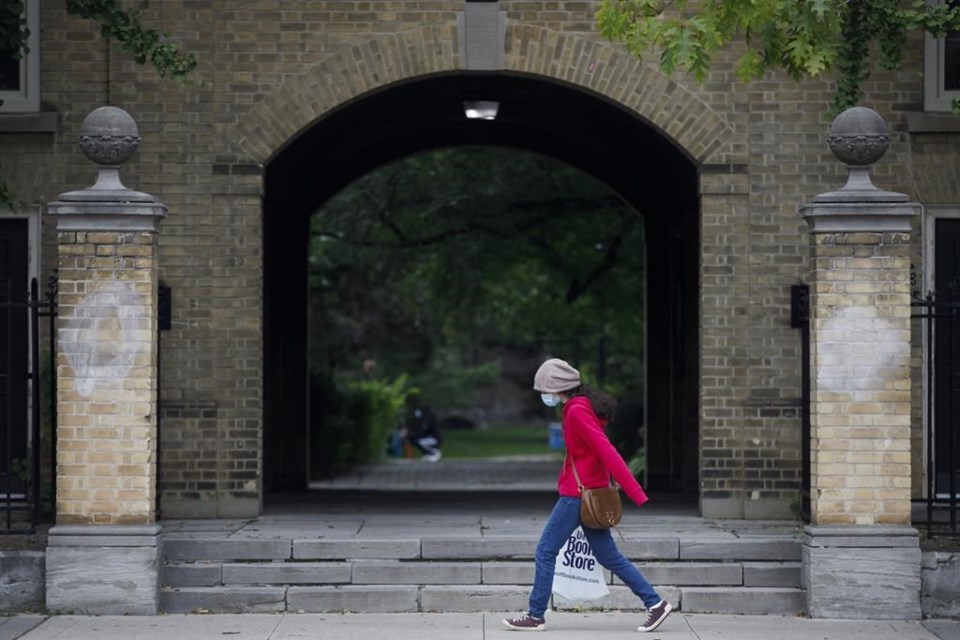TORONTO — A Toronto university's decision to require those living in student residences to have at least three doses of a COVID-19 vaccine could boost third-dose uptake among young adults, but it won't drive a significant increase unless other schools follow suit, experts say.
The University of Toronto announced last week that it was reinstating a vaccination requirement for those living in its residences and updating it to mandate at least one booster shot. It also recommended all others on campus stay "up-to-date" on COVID-19 vaccinations.
Dr. Fahad Razak, the scientific director of the Ontario COVID-19 Science Advisory Table, said the policy could help boost uptake among younger adults, noting the university's large student body and evidence about the effect of vaccine requirements.Â
But he said there would likely be a greater impact on uptake if other universities and colleges implemented a similar policy.Â
"There seems to be fairly robust evidence that when you require vaccination to be in a certain space, more people end up getting vaccinated because of that," he said.Â
"If more universities followed a similar policy, you would find, likely, an enhanced vaccine uptake of third doses, or potentially even other doses."Â
Third-dose uptake in the 18-29 age group is currently about 36 per cent nationally, which is lower than every other adult age group in Canada. By comparison, roughly 86 per cent in that young adult cohort have two doses of a COVID-19 vaccine.Â
Dr. Susy Hota, medical director of infection prevention and control at the University Health Network in Toronto, said having post-secondary institutions "aligned" on vaccine policies would help boost third-dose uptake among young adults.Â
"It's never great when only one or two are doing something and others are not," she said. "People may choose not to go to places that have additional requirements if they're feeling fatigued by that and there are other options."
Hota added that vaccine requirements should evolve over time as more doses become available to ensure maximum protection, especially since immunity from vaccines wanes over time.Â
"Really it is about keeping up-to-date with immunizations," she said.Â
"We use that language for childhood immunizations and other things like that, which are required for schools and daycares and such. We should start thinking about that language for COVID vaccines too."
With the current variants of COVID-19 that are spreading, both Razak and Hota said having at least three doses of a COVID-19 vaccine provides people with a "better degree of protection" from COVID-19 than just two doses. Razak noted that three doses can also prevent severe illness and disruptions to a person's life.Â
Razak suggested vaccinations are "only one part of the strategy" against COVID-19, and said universities, which often tend to have older buildings, should make investments in air filtration devices and promote masking as well.
The University of Toronto Students' Union said it supports the university's policy to require three doses of a COVID-19 vaccine for those moving into campus residences, adding it is "deeply grateful to see the university being proactive and cautious as we enter another unpredictable fall."Â
However, it emphasized that "the onus of COVID-19 mitigation in residences should not be placed solely on students." It asked that the university continue its wastewater testing initiative, continue to offer rapid antigen and/or PCR tests for students, improve ventilation in its buildings and frequently disinfect communal settings.
The university stopped requiring proof of vaccination for those attending classes in person on May 1. It also gradually lifted its mask mandate in its indoor spaces, but is still encouraging people to wear medical masks in high-density indoor spaces when physical distancing is not possible.Â
- with files from Maan Alhmidi.
This report by The Canadian Press was first published Aug. 4, 2022.Â
—â¶Ä”â¶Ä”
This story was produced with the financial assistance of the Meta and Canadian Press News Fellowship. Â
Noushin Ziafati, The Canadian Press



